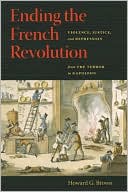

 |

|

The average rating for Ending the French Revolution: Violence, Justice, and Repression from the Terror to Napoleon based on 2 reviews is 3.5 stars.
Review # 1 was written on 2011-04-14 00:00:00 Rafael Vazquez Rafael VazquezA drag to read - the author never met a minor detail he didn't like - but contains some truly original and penetrating insights on the weakness of the French Revolutionary state and the collapse of its political legitimacy in the late 1790s. Banditry in the countryside, the imposition of states of siege on French cities (bringing 40 percent of the population under martial law), and the Directory's cancellation or revision of elections all demonstrated a rapidly declining commitment to the rule of law and government by consent of the people. Whoever wrote that Napoleon did not so much murder as euthanize the French Republic was right. |
Review # 2 was written on 2017-12-03 00:00:00 Marina Kalkum Marina Kalkum(3.5) "When they die, Wilde wrote, all good Americans go to Paris. Some of us have always tried to get there early and beat the crowds." Gopnik, a Francophile and New Yorker writer, lived in Paris for five years in the late 1990s with his wife and son (and, towards the end of their sojourn, a newborn daughter). Like Julian Barnes's Something to Declare or Geoff Dyer's Working the Room, this is a random set of essays arising from the author's experience and interests. By choosing any subject that took his fancy at the time - whether the World Cup, a Nazi war crimes trial, fashion, or gastronomy - Gopnik gleefully flouts conventions of theme and narrative, yet still manages to convey the trajectory of his years in Paris, generally through his young son Luke's development, as in "He saw, I realized, exactly the way that after five years I spoke French, which also involved a lot of clinging to the side of the pool and sudden bravura dashes out to the deep end to impress the girls, or listeners." Gopnik is at his best when writing about food (my favorite of his books is The Table Comes First) and bureaucracy: "The French birth certificate was like the first paragraph of a nineteenth-century novel, with the baby's parents' names, their occupations, the years of their births and of their emigration, their residence, and her number, baby number 2365 born in Neuilly in 1999." It's interesting to hear about Halloween creeping into France, as it's also done in the UK. In places, though, this does feel exceptionally dated: relying on a copy shop to do the household bills; David Beckham only being engaged to Posh Spice at the time of a World Cup game. What's timeless, though, are his insights about the ambivalence of the expatriate experience, which certainly resonated for me: The loneliness of the expatriate is of an odd and complicated kind, for it is inseparable from the feeling of being free, of having escaped. There are times, as one reads about the uninsured and the armed and the executed, when French anti-Americanism begins to look extremely rational. It is soup, beautiful soup, that I miss more than anything, not French soup, all puréed and homogenized, but American soup, with bits and things, beans and corn and even letters, in it. "We have a beautiful existence in Paris, but not a full life," Martha said, summing it up, "and in New York we have a full life and an unbeautiful existence." I must thank my Goodreads friend Ted Schmeckpeper for passing this book along to me. |
CAN'T FIND WHAT YOU'RE LOOKING FOR? CLICK HERE!!!